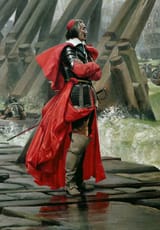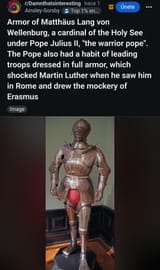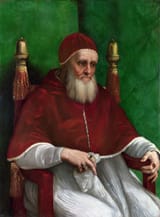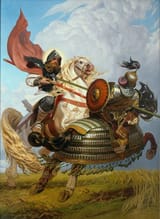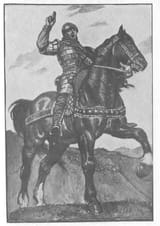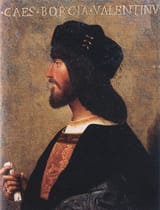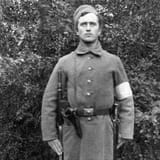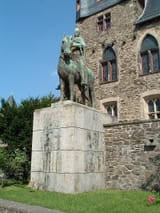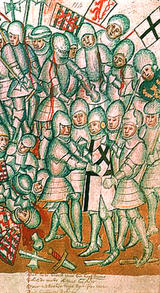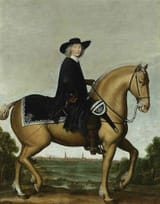Warrior Priests
Are there any more examples of Christian priests (pope, cardinal, bishop, etc.) who were also military leaders or warriors?
>Richelieu personally directed France’s military strategy during the Thirty Years’ War, organizing campaigns, fortifying cities, and overseeing the deployment of troops.
Anonymous
8/20/2025, 6:58:37 PM
No.17937242
>>17937250
>>17937230
He once personally traveled to sort out of a prolonged siege, took command from the incompetent general, participated in storming the walls, and then rigorously kept the troops in line to prevent them from raping and looting.
Anonymous
8/20/2025, 7:04:12 PM
No.17937250
>>17938427
>>17937230
>>17937242
Chaddest pope ever
He was described as being of imposing stature and physically strong. He also enjoyed fist fighting people. I read somewhere that he once beaten Michelangelo (who was also his friend) during an argument
Anonymous
8/20/2025, 7:35:43 PM
No.17937314
archbishop Turpin, probably not real th, but during the reconquista there were many, many warrior monks
Anonymous
8/20/2025, 7:52:13 PM
No.17937336
>>17937394
>>17937225 (OP)
Loyola was a former mercenary and arguably the first glowni**er in western history
Anonymous
8/20/2025, 7:59:57 PM
No.17937345
Leonidas Polk the “Fighting Bishop” was a major general in the Confederate army and an Episcopalian bishop. He wasn’t an especially good general and met his end almost sliced in half by an artillery shell after Sherman ordered his men to fire on a scouting party of Confederate officers.
Anonymous
8/20/2025, 8:18:50 PM
No.17937376
Cesare Borgia was a bishop, archbishop, and abbot before beginning his career as a mercenary.
Anonymous
8/20/2025, 8:28:35 PM
No.17937399
>>17937411
Finnish Lutheran priest and extreme nationalist Elias Simojoki participated in Finnish Civil War and then in several voluntary but state approved "private" military expeditions in Karelia in attempt to ignite both anti-bolshevik and general anti-Russian insurrection among Karelians and to expand Finland's territory. Those expeditions didn't really amount to anything. He was too old to be drafted in Winter War, but volunteered and was assigned as a military chaplain, but he still carried guns and put himself in front lines. He was killed when he went to no-man's land to euthanize a wounded horse.
According to people of his parish he was really friendly and altruist kind of a Christian with great sense of humor, who would pay debts of poor families from his own pockets. Simultaneously he supported total communist and Russian death.
Anonymous
8/20/2025, 8:30:01 PM
No.17937403
>>17937409
>>17937394
jesuits build the first global intel network
Anonymous
8/21/2025, 10:37:39 AM
No.17938427
>>17937250
His relationship with Michelangelo was complicated. Michelangelo got so mad at him due to creative disputes related to painting of Sistine Chapel that he left Rome entirely for years before actually coming back and doing it. Attempts to lure him back included appeal to his spite with claims that the papal court architect Donato Bramante is talking shit about him and his painting skills.
Anonymous
8/21/2025, 11:35:00 AM
No.17938445
>>17939002
>>17937225 (OP)
>Richelieu
>priest
Did he do mass and other religious services instead of just dealing with the administration of a bishopric and such?
Anonymous
8/21/2025, 6:27:21 PM
No.17939002
>>17937225 (OP)
Engelbert I. of Berg was the Archbishop of Cologne and in his early life as the provost he took up arms in support of the Staufer dynasty. For this he got banned by the pope in 1206 but was reinstated already in 1208. In 1212 he joined the Albigensian Crusade. And in 1216 he became Archbishop and then waged multiple feuds in order to expand his territory.
>>17938445
Probably. Before his rise to power he was an ordinary clergymen after all.
Anonymous
8/21/2025, 6:29:10 PM
No.17939004
Another Archbishop of Cologne who took up arms was Siegfried von Westerburg.
And this really isn't something out of the ordinary as such high position ecclesiastical lords also perfomed duties as secular rulers as well.
Anonymous
8/21/2025, 8:25:22 PM
No.17939253
Christoph Bernhard von Galen, the Prince-Bishop of Münster 1650-78, had a nickname "Bommen Berend" due to his extensive use of cannons and bomb shots in warfare. While that sounds cool, his military career was mediocre at best, and his most impressive display of firepower against the Dutch city of Groningen still ended in his retreat.
